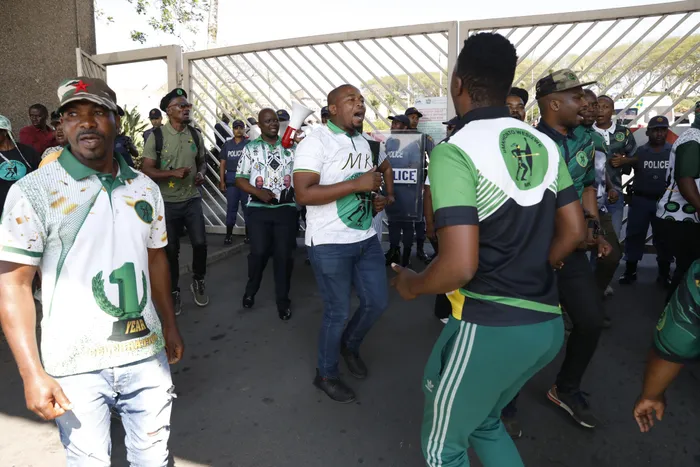Youth unemployment crisis: South Africa's Labour Desk targets illegal foreign workers

Umkhonto we Sizwe Labour Desk has successfully organised 200 job placements for South Africans in Pietermaritzburg
Image: Doctor Ngcobo/ Independent Newspapers
To combat the alarming rate of unemployment, particularly among South African youth, the UMkhonto weSizwe's (MK) Labour Desk has embarked on a campaign to remove illegal foreigners from positions that could be filled by locals.
With youth unemployment hovering around the 60% mark, the MKP members believe that urgent systemic changes were needed.
Calvin Gcabashe, a representative from the MKP's Labour Desk, said: “We cannot allow foreigners to occupy positions that South Africans can fill. Our fight is to ensure that our people are employed and contribute to our economy.”
He maintained that their efforts were to empower locals rather than disrupt businesses, and through engagements with companies, they were able to secure nearly 200 new jobs for South Africans around Durban and Pietermaritzburg.
Their efforts also included visits to local companies to evaluate the legality of foreign workers on their payrolls, and the exercises were done transparently, with prior notice of their visits issued to the respective businesses.
A team led by national coordinator Mlungisi Mancinza Zondi and provincial coordinator Musa Mhlongo uncovered an unlawful garment factory operating within the premises of Clairwood Secondary School, Durban.
The discovery not only highlighted potential legal issues but also raised questions about the employment statuses of the foreign nationals working there.
About the visit to the school, Gcabashe said: “Upon our arrival, we were met with resistance; however, it was confirmed that the principal was fully aware of the factory's presence. According to the principal, the factory was "a tenant that pays monthly rental fees.”
Garments bearing the branding of a well-known South African clothing retailer were being worked on at the factory. The school's principal refused to comment but referred the publication to the department of Education.
Gcabashe revealed that the Labour Desk would seek immediate clarification from relevant authorities on the legitimacy of the business operation on the school's premises.
He said they would also intend to contact the clothing retailer about whether they were aware of the dynamics of the manufacturing operation in Clairwood and the alleged infractions of labour laws.
The controversial appointment of Dr Martin Nsibirwa, a Ugandan national, as the head of research at the South African Human Rights Commission (SAHRC) has received much attention recently.
This development has provoked concern among citizens regarding the representation of local professionals in key institutions tasked with advocating for the rights of South Africans.
Lerato Ngobeni of ActionSA has been vocal about the necessity for local leadership, asserting, “Institutions established under the South African Constitution must be led by South Africans who understand and live the historical struggles that the Commission was mandated to address.”
Her concerns resonated with many citizens whose frustrations have bubbled over on social media platforms, where they rallied for the prioritising of local employment and challenged the perceived foreign favouritism tendancies.
DAILY NEWS